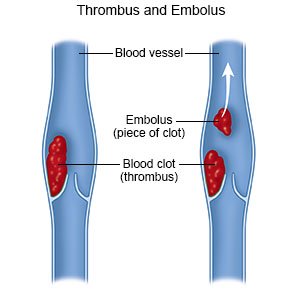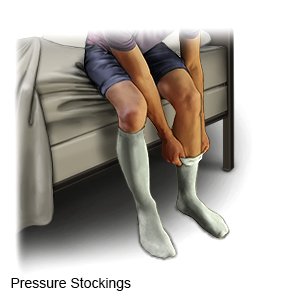Embolectomy
Medically reviewed by Drugs.com. Last updated on Apr 6, 2025.
Recovery from an embolectomy may take weeks to months. You will need to take medicine to thin your blood to prevent new clots from forming. Your surgeon will tell you how long to take this medicine. Watch for signs of a new clot forming.
 |
DISCHARGE INSTRUCTIONS:
Call your local emergency number (911 in the US) or have someone call if:
- You have any of the following signs of a heart attack:
- Squeezing, pressure, or pain in your chest
- You may also have any of the following:
- Discomfort or pain in your back, neck, jaw, stomach, or arm
- Shortness of breath
- Nausea or vomiting
- Lightheadedness or a sudden cold sweat
- You have any of the following signs of a stroke:
- Numbness or drooping on one side of your face
- Weakness in an arm or leg
- Confusion or difficulty speaking
- Dizziness, a severe headache, or vision loss
- You feel lightheaded, short of breath, and have chest pain.
- You cough up blood.
Seek care immediately if:
- Your arm or leg feels warm, tender, and painful. It may look swollen and red.
- The surgery area does not stop bleeding even after you apply firm pressure for 10 minutes.
- The leg or arm used for surgery is numb, painful, or changes color.
- The bruise at your catheter site gets bigger or becomes swollen.
- You have purple spots or blisters on your skin.
Call your surgeon or hematologist if:
- You have a fever.
- You have a new skin rash and itching.
- You feel weak, lightheaded, or faint.
- You have new swelling around your eyes.
- You see blood in your urine.
- You have pain at the surgery site that does not get better with pain medicine.
- You have questions or concerns about your condition or care.
Medicines:
- Antiplatelets , such as aspirin, help prevent blood clots. Take your antiplatelet medicine exactly as directed. These medicines make it more likely for you to bleed or bruise. If you are told to take aspirin, do not take acetaminophen or ibuprofen instead.
- Blood thinners help prevent blood clots. Clots can cause strokes, heart attacks, and death. Many types of blood thinners are available. Your healthcare provider will give you specific instructions for the type you are given. The following are general safety guidelines to follow while you are taking a blood thinner:
- Watch for bleeding and bruising. Watch for bleeding from your gums or nose. Watch for blood in your urine and bowel movements. Use a soft washcloth on your skin, and a soft toothbrush to brush your teeth. This can keep your skin and gums from bleeding. If you shave, use an electric shaver. Do not play contact sports.
- Tell your dentist and other healthcare providers that you take a blood thinner. Wear a bracelet or necklace that says you take this medicine.
- Do not start or stop any other medicines or supplements unless your healthcare provider tells you to. Many medicines and supplements cannot be used with blood thinners.
- Take your blood thinner exactly as prescribed by your healthcare provider. Do not skip a dose or take less than prescribed. Tell your provider right away if you forget to take your blood thinner, or if you take too much.
- Take your medicine as directed. Contact your healthcare provider if you think your medicine is not helping or if you have side effects. Tell your provider if you are allergic to any medicine. Keep a list of the medicines, vitamins, and herbs you take. Include the amounts, and when and why you take them. Bring the list or the pill bottles to follow-up visits. Carry your medicine list with you in case of an emergency.
Care for the surgery area as directed:
- Keep the area clean and dry. Your healthcare provider will tell you when you can bathe. You will need to keep the bandage in place and dry for a day or two after your surgery. Cover the bandage with a plastic bag and tape the opening around your skin to keep water out.
- Carefully wash around the area with soap and water when it is okay to bathe. Let soap and water run gently over the area.
- Dry the area and put on new, clean bandages as directed. Check the area every day for signs of infection, such as redness, swelling, or pus. Change your bandage if it gets wet or dirty.
Drugs used to treat this and similar conditions
Eliquis
Eliquis (apixaban) is used to reduce the risk of stroke and systemic embolism in patients with ...
Xarelto
Xarelto (rivaroxaban) is a factor Xa inhibitor used to reduce the risk of blood clots and stroke in ...
Ozempic
Learn about Ozempic (semaglutide) for type 2 diabetes treatment, weight management, cardiovascular ...
Plavix
Plavix (clopidogrel) is used to prevent blood clots after a recent heart attack or stroke. Includes ...
Lovenox
Lovenox is used to prevent deep vein thrombosis (DVT) which can lead to blood clots in the lungs ...
Coumadin
Coumadin is used to prevent heart attacks, strokes, and blood clots in veins and arteries. Learn ...
Rivaroxaban
Rivaroxaban systemic is used for atrial fibrillation, cardiovascular risk reduction, congenital ...
Apixaban
Apixaban systemic is used for deep vein thrombosis, deep vein thrombosis prophylaxis after hip ...
Enoxaparin
Enoxaparin systemic is used for acute coronary syndrome, angina, deep vein thrombosis, deep vein ...
Isoxsuprine
Isoxsuprine systemic is used for cerebrovascular insufficiency, coronary artery disease, raynaud's ...
Follow your healthcare provider's directions for daily activities:
Your provider will give you instructions based on the type of embolectomy you had. The following are general safely guidelines to follow:
- Your provider will tell you when it is safe to drive, be active, and do normal daily activities. An active lifestyle can help prevent blood clots. Try to get at least 30 minutes of activity on most days of the week. If you sit most of the day for work, stand or walk around every half hour. After a future injury or illness, try to become active again as soon as possible. Activity can also help you manage your weight. Extra body weight can put pressure on your leg veins and cause blood to pool. This increases your risk for another blood clot.

- Do not lift anything heavier than 10 pounds for 2 days after your surgery. For example, a gallon of milk weighs 8 pounds.
- Do not strain when you have a bowel movement. This may cause bleeding from the area where you had the embolectomy. Ask your provider if you need medicine to help make your bowel movements easier.
Wear a compression device as directed:
Examples include pressure stockings, intermittent pneumatic compression, and sequential compression devices. A compression device puts pressure on your lower legs to help keep blood from pooling in your leg veins. Your healthcare provider can prescribe the right device for you. Do not buy over-the-counter devices unless your provider says it is okay. They may not fit correctly or may have elastic that cuts off your circulation. Ask your provider when to start wearing a compression device and how long to wear it.
 |
Drink more liquids:
Liquid can help prevent blood clots. Ask your healthcare provider how much liquid to drink each day and which liquids are best for you.
Do not smoke:
Nicotine and other chemicals in cigarettes and cigars can cause blood vessel and lung damage. Ask your healthcare provider for information if you currently smoke and need help to quit. E-cigarettes or smokeless tobacco still contain nicotine. Talk to your healthcare provider before you use these products.
Limit alcohol as directed:
Limit alcohol to 1 drink a day if you are female. Limit alcohol to 2 drinks a day if you are male. A drink is 12 ounces of beer, 5 ounces of wine, or 1½ ounces of liquor.
Follow up with your surgeon or hematologist as directed:
You may need to be checked for blood clots for up to 3 years after treatment. Write down your questions so you remember to ask them during your visits.
© Copyright Merative 2025 Information is for End User's use only and may not be sold, redistributed or otherwise used for commercial purposes.
The above information is an educational aid only. It is not intended as medical advice for individual conditions or treatments. Talk to your doctor, nurse or pharmacist before following any medical regimen to see if it is safe and effective for you.
Further information
Always consult your healthcare provider to ensure the information displayed on this page applies to your personal circumstances.
